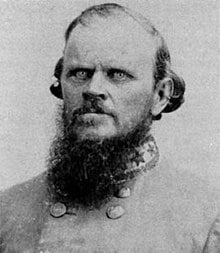Nathan George Evans was a captain in the 2nd U.S. Cavalry who became a brigadier general in the Confederate States Army during the American Civil War. Due to an injury, he left the command of brigadier general and served in a lesser role throughout the war. After the war, he retired to public life but died in 1868.

Early Life
Born in Marion County, South Carolina (named after Revolutionary War Hero Francis Marion) on February 3, 1868. While growing up in the southern state of South Carolina, he attended Randolph-Macon College until landing an appointment to West Point given to him by the prominent South Carolina politician John C. Calhoun.
He served on the western frontier prior to the Civil War, where he earned a reputation for being a hard drinker and excellent commander.
Civil War
Evans was commissioned a colonel and commanded a small brigade at the First Battle of Bull Run, where he was the first Confederate field commander to perceive the Union intended to attack the Confederate left flank at dawn. His command went far toward saving the day for the South. During the thick of the fight, he was everywhere, closely followed by an aide carrying his "barrelito" (small barrel) of Evans' favorite whiskey on his back.
A number of examples of Evans' good tactical leadership and bravery in battle are recorded. However, his abrasive personality and his passion for intoxicating beverages led to his constant difficulties with colleagues and superiors.
He was given command of a brigade of Mississippi and Virginia troops and assigned to guard the upper fords of the Potomac River above Washington, D.C... In October 1861, a Union force crossed the river near Leesburg, Virginia, and at the Battle of Ball's Bluff, Evans' command drove the enemy into the Potomac River, inflicting great loss. Evans was promoted to brigadier general to be effective from the day of the battle.
He was then sent to assist in defending the coastal areas just south of Charleston. He was placed in command of the First Military District, which included the village of Secessionville, just two days before the battle there, but played little part in it.
He also commanded Confederate forces in the Engagements at Pineberry, Willtown, and White Point. In July 1862, he was given command of a newly formed brigade of South Carolina troops and led it to Richmond to join Robert E. Lee's Army of Northern Virginia.
Evans' Brigade participated in the battles of Second Bull Run, South Mountain, and Antietam in 1862 and was then assigned to Eastern North Carolina to oppose a major Union raid on Kinston and Goldsboro. After this campaign, he was tried and acquitted of drunkenness during the Battle of Kinston.
At Second Bull Run, Evans' brigade was attached to Brig. Gen John B. Hood's division, and since Evans ranked Hood, had authority over him for the campaign. The two generals got into an argument after the battle, and Evans had Hood arrested, but Robert E. Lee ordered him to release Hood and restore him to command. At Antietam, Evans commanded a demi-division consisting of his own and Col. George T. Anderson's brigades.
In the summer of 1863, Evans' brigade was assigned to General Joseph E. Johnston's army during the Vicksburg Campaign. After this campaign, the brigade returned to Charleston, where Evans quarreled with his superior, General Roswell S. Ripley, who had him tried for disobedience of orders.
Following Evans' acquittal, General P.G.T. Beauregard still considered Evans incompetent and would not return him to command. He was finally reinstated to command in the spring of 1864 but was severely injured in a buggy accident in Charleston as he was preparing to take his brigade north to the Petersburg Campaign.
Evans' Brigade, renamed for its new commander, Brigadier General Stephen Elliott, Jr., would soon find itself in the Petersburg trenches directly above the Union mine and suffer heavy casualties at the Battle of the Crater.
Death
Nathan George Evans served as a high school principal in Cokesbury and then in Midway, Alabama. He never fully recovered from his war wounds and probably died because of them.
He died in Midway, Alabama, and was eulogized by Robert E. Lee's son, General William Henry Fitzhugh Lee.
